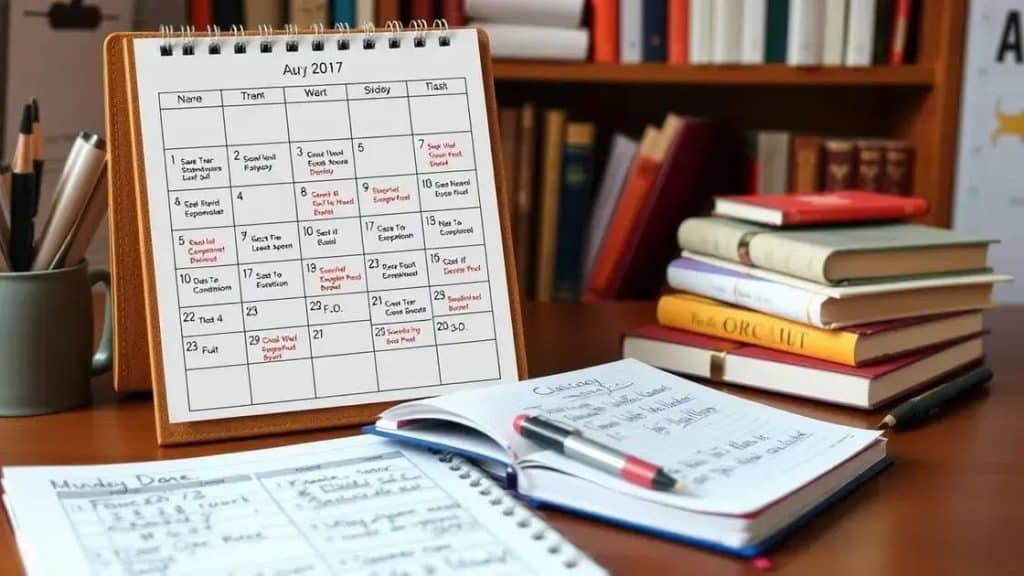Into academic year calendar: how to maximize learning

To succeed in the academic year, focus on understanding the calendar, setting achievable goals, maintaining a routine, and balancing study with personal life while staying motivated through connections and rewards.
Into academic year calendar? It’s essential for students aiming to optimize their learning experience. With a structured calendar, you can navigate through your courses seamlessly and make the most of your educational journey. Ready to explore how this can enhance your studies?
Understanding the academic year calendar
Understanding the academic year calendar is crucial for students. It provides a roadmap for managing time efficiently and maximizing learning opportunities. Having a clear idea of this calendar can significantly impact your study habits and help you excel.
The Structure of an Academic Year
An academic year typically consists of multiple terms or semesters. These terms may vary by institution but generally include:
- Fall Semester: Often starts in late August or early September.
- Spring Semester: Usually begins in January.
- Summer Sessions: Shorter sessions that may occur in June or July.
Each term comes with its own schedule of classes, exams, and breaks, which makes understanding it essential for planning.
Key Dates to Remember
One of the critical aspects of the academic year calendar is knowing important dates. Mark these on your planner:
- Registration deadlines for courses.
- Exam dates and periods.
- Holidays and school breaks.
Being aware of these dates can significantly help reduce stress and allow for better preparation.
Moreover, it’s important to note that each school may have unique dates and schedules. Thus, always check with your institution’s academic calendar to avoid any surprises.
As the academic year progresses, students can use this understanding to create a study schedule that aligns with their commitments. By recognizing patterns in the academic calendar, students can also plan for busy periods and allocate sufficient time for personal studies and projects.
By organizing your time around the academic year calendar, you can manage your study materials effectively, focus on exam preparations, and ensure that you are not overwhelmed. This proactive approach leads to improved academic performance and a better understanding of your studies.
Key dates every student should know
Key dates every student should know are essential to navigating the academic year successfully. Understanding these dates can help students stay organized and on track throughout the semester.
Important Academic Dates
There are several key dates that students need to keep in mind. These often include:
- Registration deadlines: Make sure to register for classes before the cutoff date.
- Exam periods: Knowing when exams are scheduled allows for better preparation.
- Holidays: These breaks let you recharge and should be planned around.
- Withdrawal dates: Learn the deadlines for dropping courses without penalties.
Being aware of these dates not only reduces stress but also enhances your ability to manage your workload effectively. When students track important deadlines, they can avoid last-minute scrambles that often lead to poor performance.
Creating a Personal Calendar
In addition to understanding the academic calendar, creating a personal calendar can be very beneficial. Note down the key dates that are specific to your courses. This personalized overview helps ensure you never miss an important deadline.
Using a planner or digital calendar is a great way to visualize your commitments. You can add reminders for each key date, helping you stay proactive. Keep in mind that proactive planning is key to academic success.
As you move through the academic year, adjusting your plans based on these key dates is a wise strategy. It allows for better time management and ensures opportunities for study breaks when they are most needed.
Tips for effective planning and organization

Tips for effective planning and organization are vital for achieving academic success. When you have a plan, it allows you to manage your time and tasks more efficiently.
Set Clear Goals
Begin by setting clear, achievable goals for your academic journey. Knowing what you want to accomplish helps guide your planning. Break larger goals into smaller, manageable tasks.
- Daily Tasks: Create a to-do list each day.
- Weekly Goals: Outline what you need to achieve by the end of the week.
- Long-Term Objectives: Keep track of semester goals and project deadlines.
Having goals helps to clarify your priorities and keep you focused on what’s important.
Utilize a Planner
Using a planner is a fantastic way to keep everything organized. Write down important dates, such as exams and deadlines. A planner can also include:
- Class schedules: This helps you allocate time wisely for study sessions.
- Assignment due dates: Keep track of what’s coming up and prepare in advance.
- Break times: Don’t forget to allocate time to rest and recharge.
With a planner, you can visualize your commitments and make adjustments as necessary.
Additionally, review your planner regularly. This practice keeps your goals fresh in your mind and helps to reinforce your commitment to staying organized. Review not only helps track progress but also provides motivation as you see what you’ve accomplished.
Ultimately, effective planning is about finding a system that works for you. Stay flexible and adjust your methods as needed to ensure you can meet your academic demands.
Balancing study and personal life
Balancing study and personal life is crucial for maintaining mental health and overall well-being. When students find this balance, they are more productive and happier.
Prioritize Your Time
Start by identifying what is important in both your studies and personal life. List your commitments and prioritize them. Consider using:
- A daily planner: This helps you allocate time for studying and social activities.
- Time blocking: Set specific blocks of time for study and relaxation.
- Regular breaks: Short breaks can boost productivity and prevent burnout.
By clearly prioritizing, you can ensure that neither your studies nor your personal life suffers.
Set Boundaries
Establishing boundaries helps maintain a healthy balance. This means setting specific times for studying and times when you disconnect to enjoy personal activities. Tell friends or family about your study schedule, so they know when to respect your time.
Learning to say no is also important. If someone invites you out during a crucial study period, politely decline. Your goals depend on your ability to focus.
Moreover, find activities that you love and make time for them. Whether it’s hanging out with friends, pursuing hobbies, or exercising, enjoy your personal time. These activities will recharge your mind, making you more efficient when studying.
Regularly assess your balance. If you feel overwhelmed, take a step back and adjust your schedule. Remember, a well-balanced life leads to not just better grades but also a happier you.
Strategies to stay motivated throughout the year
Strategies to stay motivated throughout the year are essential for achieving academic success. Staying motivated can sometimes be tricky, but with the right approaches, you can keep your spirits high.
Set Small Goals
Breaking larger tasks into smaller, more achievable goals is a great way to boost motivation. This process allows you to celebrate small victories along the way. Small goals can include:
- Daily study targets: Aim to complete a certain number of pages or chapters.
- Weekly achievements: Focus on finishing a specific project by the end of the week.
- Personal rewards: Treat yourself after reaching a goal.
These small milestones make the learning process feel more manageable and rewarding.
Establish a Routine
Having a consistent routine helps maintain momentum. Schedule specific times each day for studying and stick to it. This structure ensures that studying becomes a regular habit, making it easier to focus.
Additionally, include breaks in your routine. Short breaks help refresh your mind, allowing you to return to studying with greater focus. Experiment with different lengths of study sessions and breaks to find what works best for you.
Finding a study environment that inspires you can also help improve motivation. Whether it’s a cozy corner in your home or a local café, make sure it’s a place where you feel comfortable and productive.
Stay Connected
Staying connected with peers can be incredibly beneficial. Join study groups or connect with classmates to share ideas and support each other. This connection provides accountability and positive encouragement throughout the academic year.
Additionally, engage with teachers or mentors. Their insights and guidance can offer support and keep you inspired. Sometimes, just a simple conversation can reignite your passion for learning.
By implementing these strategies, you can maintain your motivation throughout the year. Remember, it’s normal to experience ups and downs, so be patient with yourself and keep striving for balance.
FAQ – Frequently Asked Questions about Academic Year Success
How can I stay organized throughout the academic year?
Using a planner to track important dates and deadlines helps you stay organized and on top of your studies.
What are some effective study habits?
Setting small goals, creating a routine, and taking regular breaks can enhance your study effectiveness.
How can I maintain motivation while studying?
Celebrate small achievements, connect with peers for support, and adjust your study plans when necessary to stay motivated.
Why is balancing personal life and study important?
Balancing both helps prevent burnout, maintains mental health, and allows for a more fulfilling academic experience.





